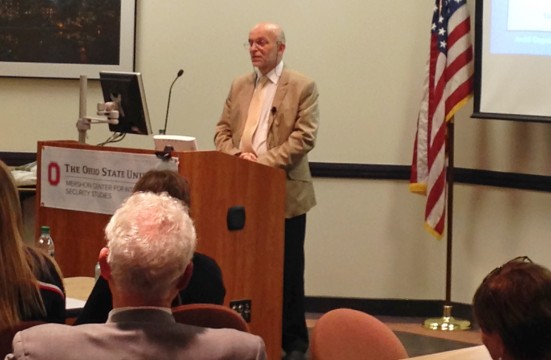
Georgian ambassador to the United States Archil Gegeshidze speaks at the Mershon Center for International Security Studies on Thursday. Credit: Jeremy Savitz / Lantern reporter
Georgian ambassador to the United States Archil Gegeshidze said he sees inclusion into NATO as a critical step into assuring the country’s safety and security, during a Thursday talk at Ohio State.
Gegeshidze — who has been in his current post since March 2013 — delivered the lecture “Georgia: Why it Matters” at the Mershon Center for International Security Studies to roughly 50 people Thursday.
Before becoming ambassador, he served at The Georgian Foundation for Strategic and International Studies as a senior fellow. Gegeshidze specialized in regional security and co-operation in the South Caucasus and Euro-Atlantic integration.
From 1992-2000, he worked for the Georgian government where he served as assistant to the head of state on national security and chief foreign policy adviser to the president.
Georgia — a country that’s had a history of uneasy relationships with neighboring countries — has been trying to join NATO for years to help ease those tensions. NATO is a military alliance between 28 member countries — including the United States — based on a treaty signed in 1949.
While many scholars feel NATO inclusion is impossible, Gegeshidze remains hopeful.
“The current status of integration into NATO is that Georgia is recognized as a candidate for membership,” Gegeshidze said. “The ball is in the field of NATO.”
But not everyone thinks that is possible.
“If the 2008 war and the current Ukrainian crisis show anything. NATO membership for Georgia or the Ukraine is simply impossible,” said George Hudson, a faculty affiliate at the Mershon Center and a retired professor emeritus of political science at Wittenberg University. “Russia wouldn’t stand for it. (President Barack) Obama’s statement (that neither country was on a path to NATO membership) was simply a recognition of reality.”
In 2008, Russia sent troops to the breakaway provinces of South Ossetia and Abkhazia in Georgia.
During the five-day conflict which ensued after the troops arrived, Georgia suffered casualties of 70 servicemen, 14 policemen and 228 civilians. There were nearly 1,750 Georgians wounded as well. Meanwhile, 67 Russian servicemen died and 283 were wounded. There were also 365 South Ossetian servicemen and civilians killed, according to an official European Union fact-finding report about the conflict.
Although Hudson said Georgia’s inclusion right now into NATO is impossible, he did say there is a very real relationship between the two.
“We (the US) are sympathetic,” Hudson said. “There is a NATO-Georgian council, a mechanism for NATO to consult with Georgia. There are ties that are being formed.”
Gegeshidze also touched on aspects of Georgia’s relationship with Russia.
“When Georgia and some political forces in the Ukraine started talking about joining NATO, this of course was something that Russia began to get nervous about,” Gegeshidze said. “That’s why Russia first tried to increase its coastal influence by adding Georgia’s coastline.”
Gegeshidze said more recently, Russia has moved into Crimea in Ukraine for similar reasons, increasing its control of the Black Sea’s coastline.
“Russia’s interest is to have loyal governments and loyal regimes on the other side of the border to be safer,” Gegeshidze said.
When comparing the situation with Georgia and Ukraine, Hudson asserts that the parallels are certainly there.
“They are two countries that are significantly inferior in most ways to Russia,” Hudson said.
Hudson said Georgia plays a vital role on the world stage.
“One of the reasons Georgia is important is because it is an emerging democracy,” Hudson said. “It hasn’t been easy for Georgia but they have established democratic institutions and a rule of law. They’re making progress.”
The progress being made in reaching a democracy does not come without complications.
“They’ve got to find some way to have decent relations with Russia,” Hudson said. “They are right next door. It’s a good case study of how a small country has to handle this very difficult task of dealing with Russia but also wanting to establish stronger ties with Europe and the West.”
Jacob Lallo, a second-year in English and political science, also stressed the importance of Georgia.
“Georgia is important because they’re a key regional ally for the U.S.,” Lallo said. “Not only are they located in a strategically important location, they’ve been incredibly supportive of American military efforts in the Middle East and have created ties with other U.S. allies, such as Israel.”
While NATO inclusion appears to be critical to the continued safety and security of Georgia, Lallo said the risks are very high for the U.S.
“I think that the U.S. has avoided supporting Georgia’s NATO bid because of the commitment it would require,” Lallo said. “Russia has proven themselves more than willing to invade Georgia, and granting them NATO membership would both increase tensions with Russia, as well create a Cold War-type situation where war with Russia could be a definite possibility.”
Some students said they were intrigued by the ambassador’s talk.
“It is certainly an interesting thing to present for a room that is not necessarily that familiar with the country, to get to know its culture,” said Caitlin Clary, a third-year graduate student in political science. “It’s in a really interesting part of the world. It’s sandwiched between Russia and the Middle East … it has its own very interesting, unique culture — in the midst of those cross-cutting influences.”


